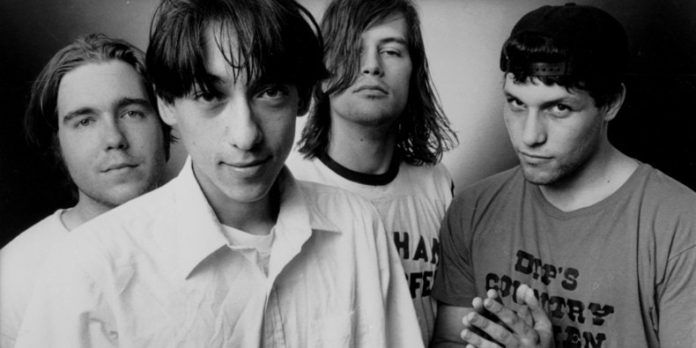
Durham-based record label Merge Records announced that it would be reissuing the first two albums in influential indie rock band Polvo’s discography.
The Chapel Hill outfit’s raw, energetic songs gained a reputation for their odd structures and tunings. Polvo’s catalogue twists and turns, constantly morphing into completely different tunes and sounds.
1992’s Cor-Crane Secret and 1993’s Today’s Active Lifestyles build long strings of tense and chaotic ideas, piecing together jumbled parts with stark changes, tempo changes and confusing time signatures. Low-toned guitar lines slip all across the fret-board, while piercing harmonics occasionally break through the mold, revealing the sinister yet infectious hooks of guitarists Ash Bowie and Dave Brylawski, backed by drummer Eddie Watkins and bassist Steve Popson.
The four-piece’s experimentality solidified them as one of the leading acts in the American underground music scene of the 1990s.
And while the band is seen as one of the pioneers of the sub-genre math rock, it’s almost impossible to place them into any restricting category or label.
Brylawski sat down with the Proconian to discuss his experience watching the band grow, and later end, as well as his thoughts on the reissues.
Seeing as Polvo hasn’t been active since 2008, do you sometimes get an itch to relive the glory days or are you content with your new life?
Not much. I mean, I’m 51 years old with three kids and I still scratch the itch by continuing to play music. I have a project with the second drummer of Polvo Brian Quast, who played on the last two records, and we have an album coming out in July. Having this outlet definitely helps relieve my want to play, create, and write. I’m also satisfied with Polvo. The band really exceeded all of our expectations; we thought we would be even lucky to release an album or play the Cat’s Cradle. That’s what we envisioned in our minds.
But it just created something much bigger than you expected?
Yeah, it just had a life of its own, and I’m grateful for where it brought us.
At the start of Polvo, with how off-the-wall and unconventional your songs were, how did you go about writing and finalizing those songs? How did they come about?
So it probably changed over time, but at the beginning it’s sort of complicated, I guess. I had been playing music for awhile, and I went to Jordan High with Steve, who’s the bass player. I grew up in Chapel Hill, but there was a teeny slice of Chapel Hill in Durham County, so I went to school in Durham. I probably played music first, but I went with Steve to buy his first guitar. I can’t remember what grade we were in. We were probably in high school. Steve and I used to play around a little bit, and I met Ash during my first week of college at UNC-Chapel Hill. Steve went to NC State, but Eddie, Ash and I all went to UNC. And when I met Ash, who was mostly the main songwriter of Polvo, he had just started playing guitar. And with our youthful energy, we would just play together. And although we wrote and refined songs, we mostly just jammed and experimented. We were just doing whatever, kind of developing our own musical language.
So that’s how your crazy style came to be?
Yeah. It was a combination of jamming, Ash and I developing our own musical tastes and linking them together. He brought his songs; I brought mine. We only brought our best. Occasionally we would collaborate on parts. It was multiple visions converging.
What makes Polvo so interesting is that style and that flare. It’s just so extraordinary. I guess when you guys were coming up with it, it wasn’t to you. You weren’t really thinking about it that way; it was just part of your band’s nature.
We were just playing what we knew how to do and, you know, it’s interesting because I would say when we progressed our abilities, we, in turn, became a little more streamlined. You know, our early stuff, even though it sounded pretty weird, was representative of us at the time. We used our limitations in both knowledge and gear to create something unique and fitting to our circumstances. It’s a sound that is impossible to recapture because we were only able to create it at that time.
It’s almost like you see the records as a relic, a piece of history.
I like that, yeah. They’re kind of essential pieces of my young life. I can look back on them and remember and hear so many things.
When you go back and listen to these records, what do you think of them?
I think it’s easy to harp on the negative, the cringe aspects of the records. Listening back on them from a more mature standpoint now is always challenging, but I think I’ve come to appreciate what I love about them and what they represent. Being a musician at 20 and being a musician at 50 are entirely different. Although it’s sometimes hard to block out the naivete and the mistakes, I look back on them proudly.
The reissues of these records, what do they mean to you? Does it give you a sense of pride to see your work republished and be loved by fans from both the past and present?
I am sort of always surprised to see how an album that we did in our twenties, 30 years ago, still has any resonance or legs, you know? So it’s a little surprising, pleasantly surprising.
Is there any chance that we will see any other reissues of your later work—Exploded Drawing or Celebrate the New Dark Age? What about any shows?
I guess that’s all market-based. If these reissues do well, maybe Merge will re-release some of that stuff. And for shows, I think we are all content with putting Polvo to rest as an active band. We are all amazed at how far it went, and we don’t really want to tarnish the band’s legacy with a new sound or look that isn’t us. When Polvo got together in 2007 and 2008, it took so much effort to balance our new mindfulness and what Polvo originally was. We didn’t want to be the same thing, nor did we want to be nothing like Polvo at all. The last thing anyone in the group wants to do is resurrect the band and be sloppy or half-ass it.
You wanted to leave a good taste.
I think we ended on a pretty good note, and I don’t think any of us want to mess with that. We are all still playing and doing our thing now, so we still satisfy our cravings to write and play, but just not under the Polvo name. We’re all still active musically, but we just want to protect Polvo’s legacy. We got it at a good place. We’re not going to mess with it.











